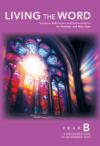Scripture Study for
Fourth Sunday of Lent
Joshua 5:9a, 10–12 / Psalm 34:9a / 2 Corinthians 5: 17–21 / Luke 15:1–3, 11–32
<< Back to LECTIONARY RESOURCES
Understanding the Word
By Dianne Bergant, C.S.A.
The first reading recounts the first celebration of Passover in the land. The story suggests that the people have just crossed the Jordan. However, mention of cakes and parched grain implies that they had been settled long enough to produce a harvest. Though the feast identified is Passover, there is no mention of the required lamb. Instead, there is a reference to unleavened cakes, suggesting the feast of Unleavened Bread. Whenever Passover was celebrated, it commemorated the Exodus from Egypt. The present story probably grew out of a celebration that combined the festivals of Passover and Unleavened Bread. Paul focuses on the reconciliation that puts an end to any enmity with God. He uses the notion of a replacement sacrifice in his explanation of how God’s reconciliation is accomplished. Though he was innocent, Christ became the sin offering for the guilty. Joined to Christ, believers now share in the righteousness of Christ, and through Christ, in the righteousness of God. Having himself been reconciled with God, Paul becomes the agent through whom God works in the lives of others. All of this God has graciously accomplished for sinners through the magnanimous sacrifice of Christ. This is the good news that Paul preaches.
Jesus singles out two groups of people, tax-collectors and sinners. To eat with such people was thought to somehow share life with them. The Pharisees and scribes, those who dealt with the Law and the things of God, criticized Jesus for the company he kept. Jesus saw this association as opening the reign of God to all. The parable illustrates the mercy that God shows to repentant sinners. It also contrasts God’s openness with the closed-mindedness of those who consider themselves faithful. Jesus is really contrasting the compassion of God with the mean-spiritedness of the Pharisees and scribes. Like the elder brother, they lack compassion and they seem to resent the fact that God is merciful toward sinners who repent.
